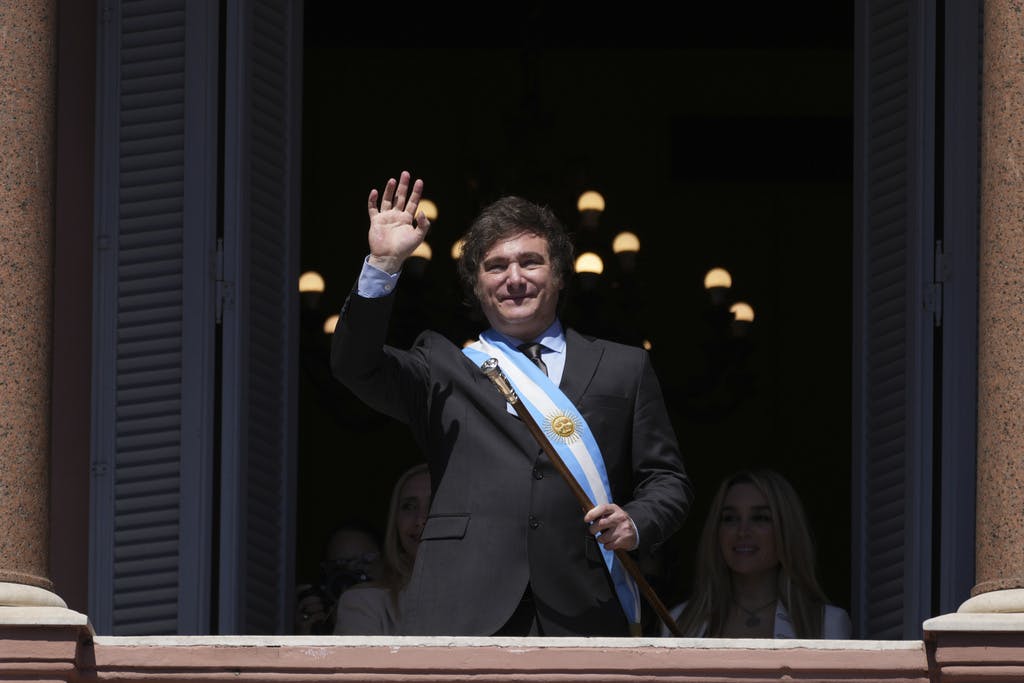Argentina Girds for the Shock of Freedom
Javier Milei is sworn in as president of the country that was once one of the richest in the world and that he thinks could be so again.

It’s El Señor Presidente now for Argentina’s Javier Milei, who begins today his radical campaign to turn around the economy of the country whose name means money and which was, once upon a time, one of the richest in the world. He campaigned with a chain saw as he vowed to cut spending, desocialize the economy, close the central bank, and move to, if not honest money at first, at least to basing Argentina’s system on the American greenback.
South America’s second-largest economy is, as the AP put it, “suffering 143 percent annual inflation, the currency has plunged, and four in 10 Argentines are impoverished. The government has a yawning fiscal deficit, a trade deficit of $43 billion, plus $45 billion debt to the IMF, with $10.6 billion due to the multilateral and private creditors by April.” Señor Milei, in his inaugural speech, warned his countrymen of “shock therapy” ahead.
There is, of course, a grand tradition of incoming presidents putting the worst possible face on the economy they inherited. In the case of Señor Milei and Argentina, it is no stratagem. Its problems are well known and often ridiculed. Señor Milei, though, is a serious economist and, one can see in his campaign, an inspired teacher and joyful, non-hating politician. It could be just the combination for which Argentina has been waiting.
What rivets our attention is the possibility and centrality of monetary reform. We’ve noted this before. We like to see Mr. Milei’s plan to dollarize the economy — meaning to make our currency Argentina’s as well — as a first step toward defining Argentina’s own currency as a legislated weight of gold or silver. That is the system the Founding Fathers envisioned and enacted. And that powered America to glory in its first 200 years.
The friends of inflation fear honest money, which was swept away in the wave of wrongheadedness of the 1970s. America itself abandoned Bretton Woods — a gold exchange standard in which America undertook to redeem in gold at a 35th of an ounce dollars presented to it by foreign governments. They like to say that no economists support honest money. In President Milei, though, the world appears to have found an economist who does.
We would look to Ludwig Erhardt, the great post-war leader in West Germany. When he was the minister of the economy, the country’s economy was dead. Shop windows were empty. People only had scrip. They fought in the streets over a single potato. When Erhardt presented to General Lucius Clay his plan for a convertible deutschmark, the allied commander said, “Herr minister, my advisers tell me it won’t work.”
“Herr general,” Erhardt said, “my advisers tell me the same thing.” When an honest deutschmark was introduced, the economy sprang to life. Overnight, goods began to appear in shop windows, inventories were brought out, companies started hiring. And the West set off on the road to the victory in a Cold War that was finally gained between 1989 and 1991. We see Erhardt and Mr. Milei as kindred spirits.
Señor Milei himself likened the moment to the fall of the Berlin Wall. He spoke from the steps of the National Congress building. “Just as the fall of the Berlin Wall marked the end of a tragic era for the world, these elections have marked the turning point for our history.” He said that no government had ever received a worse inheritance than his and warned that much of the brunt of reform would “fall on the public sector.”
“Even if we stop printing money today,” Mr. Melei said, “we will continue to pay the costs of the monetary imbalance of the outgoing government. We are going to pay for it in inflation.” He declared it would be “necessary to clean up the Central Bank’s interest-bearing liabilities, thus putting an end to money-printing and with it, the only empirically true and theoretically valid cause of inflation.” He decreed consolidating 18 ministries into nine.
Mr. Milei himself spent much of his speech warning of the difficulties ahead and downplaying any suggestion that it will all be easy. “I prefer an uncomfortable truth to a comfortable lie,” he said at one point. Argentina has “no possible alternative” to a period of austerity, he said, nor “any room for discussion between shock and gradualism. All the gradualist programmes ended badly.” Said he: “The only way out of poverty is with more freedom.”

